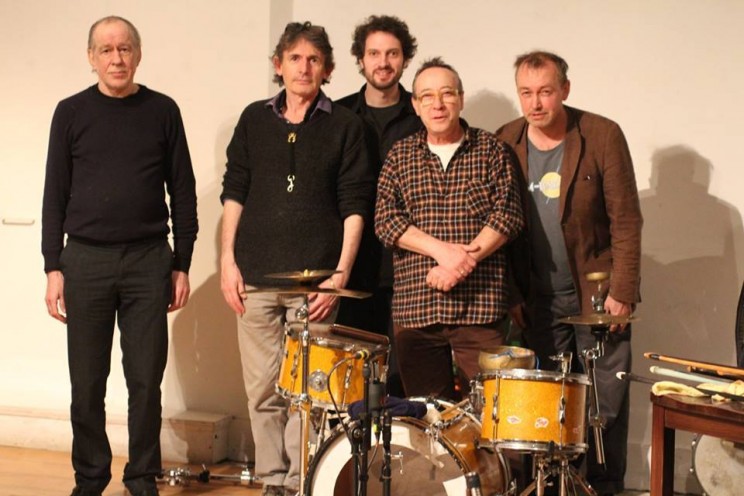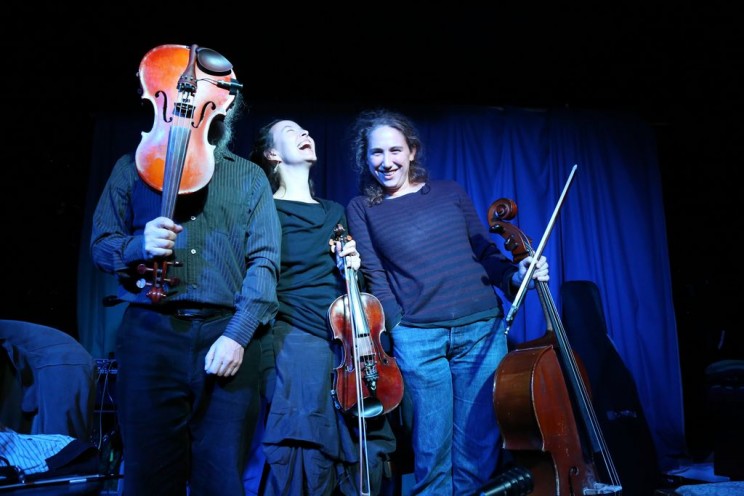Thursday 22 March doors 8pm – start 8.30pm | £8/£6 cons

The Runcible Quintet
The Runcible Quintet consists of soprano saxophonist Adrian Northover, flautist Neil Metcalfe, acoustic guitarist Daniel Thompson,double bassist John Edwards and Italian-born drummer Marcello Magliocci. The five are London-based and all are members of the London Improvisers Orchestra (LIO) which convenes monthly for a performance. The LIO has spawned many a spin-off ensemble (including Barrel and Stellari String Quartet, to name but two.) Because of the empathy engendered by their members regularly playing together in LIO, such groupings have tended to work well together, the Runcible Quintet being the latest example of that pattern. Five was recorded in April 2016, IKLECTIK, a performance venue favoured by LIO, just across the Thames from Big Ben. The album consists of five tracks, somewhat unimaginatively entitled “One”, “Two”, “Three”, “Four” and “Five”, totalling under forty-five minutes. All of the music was freely improvised by the five players. Although the quintet’s instrumentation may suggest a front line of saxophone and flute supported by a rhythm section of guitar, bass and drums, the reality is far freer and looser than that, with all five players improvising throughout. On “One”, their playing is tentative as they feel their way, hinting that this is not a well-established quintet. By “Two”, they sound more assured and the music starts to flow freely, kick-started by a sprightly, assured flute passage from Metcalfe that seems to relax everyone. “Three” and “Four” are longer pieces that form the heart of the album; throughout each of them, the five engage in a series of animated exchanges that radiate confidence and the sheer joy of playing together; interchanges between flute and saxophone are particularly noteworthy. “Five” is a brief end piece that draws the album to a satisfying conclusion, and leaves the listener wanting more. The music on Five is good, old-fashioned improv that could easily have been recorded in any year from the mid-seventies onwards. It augurs well for future albums from this quintet. Sharp-eyed readers will have noticed that the word “runcible” is borrowed from the comic writings of Edward Lear. The word itself is a piece of Lear nonsense without any agreed meaning, often being attached to non-existent objects such as the “runcible spoon” of Lear’s best-known work The Owl and the Pussycat. We must hope that its inclusion in this quintet’s name is not intended to signal that the group was a one-off and is actually non-existent itself. More, soon, please.”-John Eyles, The Squid’ E

Alison Blunt violin – Ivor Kallin viola – Hannah Marshall cello
The first performance bringing the trio together was in 2007 at Freedom of the City Festival
in London. It was so enjoyable that the musicians decided to form a band and called
themselves Barrel, as it involved a lot of scraping. Barrel has since gained a formidable
reputation through mainland and international performances and recordings. Their 1st
album Gratuitous Abuse was in the Wire Magazine’s annual critic’s choice list of improv’
releases and both this and Barrel – Live At Artacts ’12 have received excellent reviews.
“They range far and wide over a vast equilateral triangle of territory with avant-garde ‘art music’,
total improv and Dada as its three vertices…you really, really need to track this astonishing combo
down toot sweet. Your glee muscles with bless you for it.” Hipster Uncle.
“To the uninitiated, this trio of string virtuosos might sound like musical terrorists…revolutionary,
funny and breathtakingly audacious.” Raul D’Gama Rose, All About Jazz
“You’ve gotta go and see this lot … especially if you’re fond of music full of jack-in-the-box
surprises. Barrel are a phenomenal multi-brained organism- lightning fast, bonkers free-improv full
of sudden comic eruptions, astonishing changes of tempo and texture, nutty, cranky little,
stumbling micro-journeys to the chicken shed then quicksilver atomisations and frantic cartoon
back-pedalling. Last time I saw them the audience were in a state of open-mouthed awe. Never
seen anything like ’em before.” Musician, composer Kev Hopper.
Barrel sound unlike anything else. Stewart Lee, Sunday Times
(Japan) contrabass cello and organizer.
He was born in Tokyo, in 1960. He started contrabass solo on Japanese jazz scene in 1982 while playing on Seikei University Orchestra (classic). In this period he played Japanese improvisers. Mototeru Takagi, Matoharu Yoshizawa, Sabu Toyozumi, Takehisa Kosugi, etc and participated in New Jazz Syndicate(group for free improvised musicians). Currently he performs in the world improvised music scene in collaboration with various musicians. Audrey Chen, Carlos Zingaro, Emilie Lesbros, Hugues Vincent, Hui-Chun Lin, Ricardo Tejero, Terry Day, Tristan Honsinger, Wolfgang Georgsdorf etc. Recent works: Matthias Boss (violin), Paulo Chagas (reeds Portugal) Trio “Little Concert in the Garden 2011″、Marcello Magliocchi “Instant Chamber Music”, Lee-Ann Joy EXPERIMENTAL SOUNDS SCULPTURES & INSTALLATIONS (art Melbourne 2011), Vassily Kaah ego & e-round (Moscow 2012), Solo Contrabass(2012) “Maresuke’s Songbook”,
Denitsa Mineva DUO in Berlin(2012)
Born in 1958 in Biel, Switzerland where he lives and dedicates himself to working with refugees and music.
He studied at the University of Bern and lived in Milan during a period devoted to painting.
He practices different artistic forms: music, writing, poetry, painting, Matthias Boss has developed an extraordinary relationship with his violin. His play, anarchic, microtonal-tonal is influenced not only by music but also by other aspects of life, destruction-construction, way of being in the moment, places … He has a genuine ability to create associated with a remarkable sound projection. He has played throughout Europe in various projects (876 trio with M. Magliocchi and J.M. Van Schouwburg), L. Casserley, A. Northover, J.Demey, C. Zingaro, J. P. Viegas, S. Siegel, R. Del Piano, P. Gibbs among others.




